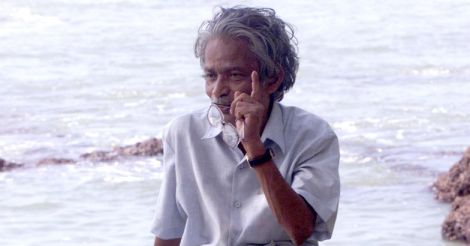A. Ayyappan, who got intoxicated by the creativity of turning the pain of the homeless into poetry, slept on shop verandas and wrote poems — which were untainted depiction of life. In his own words, destitution and insecurity transformed him into a poet.
Intoxicated by liquor, he walked from one street to another by writing and singing piercing poems. Ayyappan was born on October 27, 1949, in Nemom, in Thiruvananthapuram district. When he was a year old, he lost his father, and at 15 he lost his mother. Ayyappan, who had said that he was not sure whether his father’s death was a suicide or a murder, wrote in a poem that his mother was pregnant at the time of the suicide. Without saying that his life and his poems were an open book for the world to see, he lived without any order and system, like a leaf floating in the river of life.
He filled his belly with alcohol, and its spirit flowed in his veins.
Ayyappan, who was an untainted communist sympathiser, wrote in his poem Manifesto Marikkathirikkatte (Let the manifesto not die):
“Give the cursed foe’s weapon to the comrade,
Let them strike out the mistakes in their book.”
Ayyappan’s poems were not the maudlin utterances about love. Instead, they were mirrors to the realities of life. They were lines dripping with the stench and the essence of pain, hunger and death. In his poem Athazham (supper), he notes the helplessness of man spoilt by hunger:
“As the crowd stood on the blood of the wayfarer
Who died in a car accident,
My eyes were on the five rupee
That flew out from the dead man’s pocket.
Wife cut the bond of marriage,
Though I was still there.
My children are scarecrows of hunger,
Let today’s supper be with this.”
Ayyappan led a penurious life and he hated old age and death. Many a times, they brimmed in his poems. Many honours were bestowed upon Ayyappan, who burnt holes in the conscience of readers with words that were embers. Days before receiving the Asan Prize for Poetry in 2010, he fell on a street on October 21 and slept forever, unnoticed by anyone. Even then, in the folds of his soiled shirt, a poem was still alive. The name of the poem that showed the fearsome canines of death and grinned was Pallu (Teeth). In that he noted:
“The arrow can pierce the back anytime
Running for life.
Beyond the hunter’s hut,
Around an oil lamp,
Relishing my taste,
There are five to eight people,
Greedy.
No tree gave me cover.
Opening a rock’s door,
Received a roar,
I fell prey to his mouth.”
The voice of Ayyappan, who was born in one October and flew the flag of anarchistic life in Malayalam poetry, and who went to sleep forever with his face on the bosom of a street in another October, is still madly ringing in the ears:
“Those who don’t poison salt,
Those who fan festering wound, thank you.”




































































































































































































































































































.jpg.image.160.84.jpg)






































































































































.jpg.image.160.84.jpg)









































 A. Ayyappan poems were mirrors to the realities of life. Photo: Onmanorama
A. Ayyappan poems were mirrors to the realities of life. Photo: Onmanorama
Disclaimer
The comments posted here/below/in the given space are not on behalf of Manorama. The person posting the comment will be in sole ownership of its responsibility. According to the central government's IT rules, obscene or offensive statement made against a person, religion, community or nation is a punishable offense, and legal action would be taken against people who indulge in such activities.